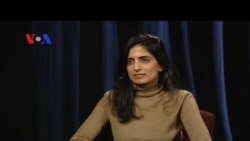There’s nothing small about Akanksha Hazari’s ambitions.
Rising from living aboard a merchant ship to make ends meet with her family, to earning degrees at Princeton and Cambridge universities, Hazari says she wants to accomplish big things. At the top of that list: helping the many millions living in India’s poorest slums get access to clean water and sanitation, education and improved health care.
But Hazari doesn’t just dream big. In 2012, the 30-something Hazari developed a mobile phone application that’s helped tens of thousands of poor residents in Mumbai’s shantytowns to improve their lives and educate their children in just a few years.
It’s called m.Paani – “m” for mobile and “paani” an Indian word for water – and it’s earned Hazari numerous awards, including the prestigious Hult Prize awarded by former president Bill Clinton and, this week, the Global Leadership Award from the women’s empowerment organization Vital Voices.
Now, Hazari says she’s ready for the next step: she wants to take her idea out of the slums of India and spread it across the developing world in Asia and Africa, all to help millions lift their quality of life.
Smart phones and Coca-Cola
“m.Paani is a mobile based loyalty program,” says Hazari, the firm’s CEO. “It takes two things that are working – technology and the reach of corporate brands – and uses that to solve what should be the most important problem, access to basic services like clean water.”
It works like this: m.Paani members use their mobile phones to buy the basics of daily life – things like food, soda, clothing, soap and such. Each time a purchase is made through one of m.Paani’s corporate partners or at affiliated local stores, the buyer earns a number of credits based on how much they spend.
Those credits, says Hazari, accumulate like dollars in a wallet. “You keep saving these credits and then can redeem them for things like a water filter or English learning books for your child, or most recently a school that was actually giving points to incentivize parents to send their children to school,” she told VOA.
The idea came to her in 2010 as she traveled through some of India’s poorest and most remote regions, and she noted two surprises.
“First, wherever I went, even the most uneducated farmer in the poorest part of the country had a mobile phone. The second thing was that in every village, no matter how poor or remote, there was a little store that always had products on the shelves.”
Why was it, Hazari wondered, that society could put a smart phone in everyone’s hands and Coca-Cola on every market’s shelves, but not address basic services such as sanitation and medicine?
It was then that Hazari first conceived of using the ubiquity of mobile phones to leverage the market buying power of millions of people on whom corporations had already spent billions of dollars building loyalty and brand identity.
“These phones are not a luxury,” she said; “they’re a necessity. It fundamentally increases what you’re getting.”
WATCH: VOA interview with App creator Akanksha Hazari
The Misunderstood Poor
Akanksha Hazari’s life has not always been an easy one. Her parents struggled financially early on; for a time, she even lived with her mother aboard a merchant ship where her father worked.
In time, fortunes changed. The family prospered and moved to Hong Kong. Akanksha became a professional squash player before pursuing advanced university studies.
“My mother’s dream was that I go to college,” she told VOA. “But I don’t think she knew she was my role model. One of the things she raised with me – I remember hearing this every day – ‘the value of your life is measured by the impact you have on the people and the world around you. Make sure you live a valuable life.’ That’s a key driver for me.”
While corporate reward programs, like those used in casinos and airlines, are nothing new, they’ve almost exclusively targeted wealthier segments of society – until now, says Hazari.
“There’s a lot of misconceptions about the poor,” she says. “People do have an income – whether it’s $2 or $4 a day, there is an income there that’s being spent. What we’re saying is why can’t we tie that to creating a second wallet based on the same spending,” thus rewarding both the buyers and the corporations.
Today, m.Paani members number in the tens of thousands in India, based on little more than word of mouth, and Akanksha Hazari is eager and ready to take it wherever it might do some good.
“If there’s an emerging market somewhere – India, Nigeria, Kenya, or anywhere else – we want to be there in five years.”







